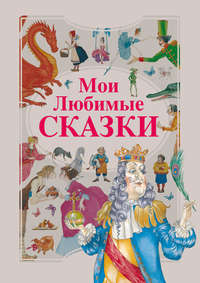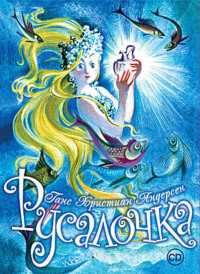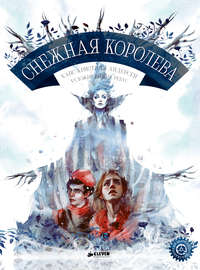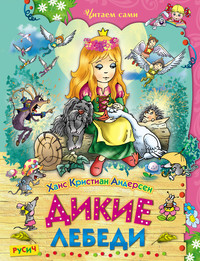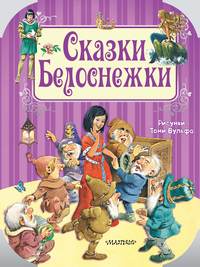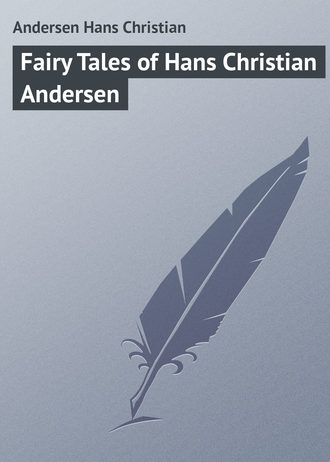 полная версия
полная версияFairy Tales of Hans Christian Andersen
The fir-tree forests on the mountains were covered with a purple hue like the heather bloom; and where the woods terminated, and the rocks became prominent, they looked almost transparent in the rich crimson glow of the evening sky. The surface of the lake was like a bed of pink rose-leaves.
As the evening advanced, the shadows fell upon the snow-capped mountains of Savoy painting them in colors of deep blue, while their topmost peaks glowed like red lava; and for a moment this light was reflected on the cultivated parts of the mountains, making them appear as if newly risen from the lap of earth, and giving to the snow-crested peak of the Dent du Midi the appearance of the full moon as it rises above the horizon.
Rudy and Babette felt that they had never seen the Alpine glow in such perfection before. "How very beautiful it is, and what happiness to be here!" exclaimed Babette.
"Earth has nothing more to bestow upon me," said Rudy; "an evening like this is worth a whole life. Often have I realized my good fortune, but never more than in this moment. I feel that if my existence were to end now, I should still have lived a happy life. What a glorious world this is; one day ends, and another begins even more beautiful than the last. How infinitely good God is, Babette!"
"I have such complete happiness in my heart," said she.
"Earth has no more to bestow," answered Rudy. And then came the sound of the evening bells, borne upon the breeze over the mountains of Switzerland and Savoy, while still, in the golden splendor of the west, stood the dark blue mountains of Jura.
"God grant you all that is brightest and best!" exclaimed Babette.
"He will," said Rudy. "He will to-morrow. To-morrow you will be wholly mine, my own sweet wife."
"The boat!" cried Babette, suddenly. The boat in which they were to return had broken loose, and was floating away from the island.
"I will fetch it back," said Rudy; throwing off his coat and boots, he sprang into the lake, and swam with strong efforts towards it.
The dark-blue water, from the glaciers of the mountains, was icy cold and very deep. Rudy gave but one glance into the water beneath; but in that one glance he saw a gold ring rolling, glittering, and sparkling before him. His engaged ring came into his mind; but this was larger, and spread into a glittering circle, in which appeared a clear glacier. Deep chasms yawned around it, the water-drops glittered as if lighted with blue flame, and tinkled like the chiming of church bells. In one moment he saw what would require many words to describe. Young hunters, and young maidens – men and women who had sunk in the deep chasms of the glaciers – stood before him here in lifelike forms, with eyes open and smiles on their lips; and far beneath them could be heard the chiming of the church bells of buried villages, where the villagers knelt beneath the vaulted arches of churches in which ice-blocks formed the organ pipes, and the mountain stream the music.
On the clear, transparent ground sat the Ice Maiden. She raised herself towards Rudy, and kissed his feet; and instantly a cold, deathly chill, like an electric shock, passed through his limbs. Ice or fire! It was impossible to tell, the shock was so instantaneous.
"Mine! mine!" sounded around him, and within him; "I kissed thee when thou wert a little child. I once kissed thee on the mouth, and now I have kissed thee from heel to toe; thou art wholly mine." And then he disappeared in the clear, blue water.
All was still. The church bells were silent; the last tone floated away with the last red glimmer on the evening clouds. "Thou art mine," sounded from the depths below: but from the heights above, from the eternal world, also sounded the words, "Thou art mine!" Happy was he thus to pass from life to life, from earth to heaven. A chord was loosened, and tones of sorrow burst forth. The icy kiss of death had overcome the perishable body; it was but the prelude before life's real drama could begin, the discord which was quickly lost in harmony. Do you think this a sad story? Poor Babette! for her it was unspeakable anguish.
The boat drifted farther and farther away. No one on the opposite shore knew that the betrothed pair had gone over to the little island. The clouds sunk as the evening drew on, and it became dark. Alone, in despair, she waited and trembled. The weather became fearful; flash after flash lighted up the mountains of Jura, Savoy, and Switzerland, while peals of thunder, that lasted for many minutes, rolled over her head. The lightning was so vivid that every single vine stem could be seen for a moment as distinctly as in the sunlight at noon-day; and then all was veiled in darkness. It flashed across the lake in winding, zigzag lines, lighting it up on all sides; while the echoes of the thunder grew louder and stronger. On land, the boats were all carefully drawn up on the beach, every living thing sought shelter, and at length the rain poured down in torrents.
"Where can Rudy and Babette be in this awful weather?" said the miller.
Poor Babette sat with her hands clasped, and her head bowed down, dumb with grief; she had ceased to weep and cry for help.
"In the deep water!" she said to herself; "far down he lies, as if beneath a glacier."
Deep in her heart rested the memory of what Rudy had told her of the death of his mother, and of his own recovery, even after he had been taken up as dead from the cleft in the glacier.
"Ah," she thought, "the Ice Maiden has him at last."
Suddenly there came a flash of lightning, as dazzling as the rays of the sun on the white snow. The lake rose for a moment like a shining glacier; and before Babette stood the pallid, glittering, majestic form of the Ice Maiden, and at her feet lay Rudy's corpse.
"Mine!" she cried, and again all was darkness around the heaving water.
"How cruel," murmured Babette; "why should he die just as the day of happiness drew near? Merciful God, enlighten my understanding, shed light upon my heart; for I cannot comprehend the arrangements of Thy providence, even while I bow to the decree of Thy almighty wisdom and power." And God did enlighten her heart.
A sudden flash of thought, like a ray of mercy, recalled her dream of the preceding night; all was vividly represented before her. She remembered the words and wishes she had then expressed, that what was best for her and for Rudy she might piously submit to.
"Woe is me," she said; "was the germ of sin really in my heart? was my dream a glimpse into the course of my future life, whose thread must be violently broken to rescue me from sin? Oh, miserable creature that I am!"
Thus she sat lamenting in the dark night, while through the deep stillness the last words of Rudy seemed to ring in her ears. "This earth has nothing more to bestow." Words, uttered in the fulness of joy, were again heard amid the depths of sorrow.
Years have passed since this sad event happened. The shores of the peaceful lake still smile in beauty. The vines are full of luscious grapes. Steamboats, with waving flags, pass swiftly by. Pleasure-boats, with their swelling sails, skim lightly over the watery mirror, like white butterflies. The railway is opened beyond Chillon, and goes far into the deep valley of the Rhone. At every station strangers alight with red-bound guide-books in their hands, in which they read of every place worth seeing. They visit Chillon, and observe on the lake the little island with the three acacias, and then read in their guide-book the story of the bridal pair who, in the year 1856, rowed over to it. They read that the two were missing till the next morning, when some people on the shore heard the despairing cries of the bride, and went to her assistance, and by her were told of the bridegroom's fate.
But the guide-book does not speak of Babette's quiet life afterwards with her father, not at the mill – strangers dwell there now – but in a pretty house in a row near the station. On many an evening she sits at her window, and looks out over the chestnut-trees to the snow-capped mountains on which Rudy once roamed. She looks at the Alpine glow in the evening sky, which is caused by the children of the sun retiring to rest on the mountain-tops; and again they breathe their song of the traveller whom the whirlwind could deprive of his cloak but not of his life. There is a rosy tint on the mountain snow, and there are rosy gleams in each heart in which dwells the thought, "God permits nothing to happen, which is not the best for us." But this is not often revealed to all, as it was revealed to Babette in her wonderful dream.
THE JEWISH MAIDEN
In a charity school, among the children, sat a little Jewish girl. She was a good, intelligent child, and very quick at her lessons; but the Scripture-lesson class she was not allowed to join, for this was a Christian school. During the hour of this lesson, the Jewish girl was allowed to learn her geography, or to work her sum for the next day; and when her geography lesson was perfect, the book remained open before her, but she read not another word, for she sat silently listening to the words of the Christian teacher. He soon became aware that the little one was paying more attention to what he said than most of the other children. "Read your book, Sarah," he said to her gently.
But again and again he saw her dark, beaming eyes fixed upon him; and once, when he asked her a question, she could answer him even better than the other children. She had not only heard, but understood his words, and pondered them in her heart. Her father, a poor but honest man, had placed his daughter at the school on the conditions that she should not be instructed in the Christian faith. But it might have caused confusion, or raised discontent in the minds of the other children if she had been sent out of the room, so she remained; and now it was evident this could not go on. The teacher went to her father, and advised him to remove his daughter from the school, or to allow her to become a Christian. "I cannot any longer be an idle spectator of those beaming eyes, which express such a deep and earnest longing for the words of the gospel," said he.
Then the father burst into tears. "I know very little of the law of my fathers," said he; "but Sarah's mother was firm in her belief as a daughter of Israel, and I vowed to her on her deathbed that our child should never be baptized. I must keep my vow: it is to me even as a covenant with God Himself." And so the little Jewish girl left the Christian school.
Years rolled by. In one of the smallest provincial towns, in a humble household, lived a poor maiden of the Jewish faith, as a servant. Her hair was black as ebony, her eye dark as night, yet full of light and brilliancy so peculiar to the daughters of the east. It was Sarah. The expression in the face of the grown-up maiden was still the same as when, a child, she sat on the schoolroom form listening with thoughtful eyes to the words of the Christian teacher. Every Sunday there sounded forth from a church close by the tones of an organ and the singing of the congregation. The Jewish girl heard them in the house where, industrious and faithful in all things, she performed her household duties. "Thou shalt keep the Sabbath holy," said the voice of the law in her heart; but her Sabbath was a working day among the Christians, which was a great trouble to her. And then as the thought arose in her mind, "Does God reckon by days and hours?" her conscience felt satisfied on this question, and she found it a comfort to her, that on the Christian Sabbath she could have an hour for her own prayers undisturbed. The music and singing of the congregation sounded in her ears while at work in her kitchen, till the place itself became sacred to her. Then she would read in the Old Testament, that treasure and comfort to her people, and it was indeed the only Scriptures she could read. Faithfully in her inmost thoughts had she kept the words of her father to her teacher when she left the school, and the vow he had made to her dying mother that she should never receive Christian baptism. The New Testament must remain to her a sealed book, and yet she knew a great deal of its teaching, and the sound of the gospel truths still lingered among the recollections of her childhood.
One evening she was sitting in a corner of the dining-room, while her master read aloud. It was not the gospel he read, but an old story-book; therefore she might stay and listen to him. The story related that a Hungarian knight, who had been taken prisoner by a Turkish pasha, was most cruelly treated by him. He caused him to be yoked with his oxen to the plough, and driven with blows from the whip till the blood flowed, and he almost sunk with exhaustion and pain. The faithful wife of the knight at home gave up all her jewels, mortgaged her castle and land, and his friends raised large sums to make up the ransom demanded for his release, which was most enormously high. It was collected at last, and the knight released from slavery and misery. Sick and exhausted, he reached home.
Ere long came another summons to a struggle with the foes of Christianity. The still living knight heard the sound; he could endure no more, he had neither peace nor rest. He caused himself to be lifted on his war-horse; the color came into his cheeks, and his strength returned to him again as he went forth to battle and to victory. The very same pasha who had yoked him to the plough, became his prisoner, and was dragged to a dungeon in the castle. But an hour had scarcely passed, when the knight stood before the captive pasha, and inquired, "What do you suppose awaiteth thee?"
"I know," replied the pasha; "retribution."
"Yes, the retribution of a Christian," replied the knight. "The teaching of Christ, the Teacher, commands us to forgive our enemies, to love our neighbors; for God is love. Depart in peace: return to thy home. I give thee back to thy loved ones. But in future be mild and humane to all who are in trouble."
Then the prisoner burst into tears, and exclaimed, "Oh how could I imagine such mercy and forgiveness! I expected pain and torment. It seemed to me so sure that I took poison, which I secretly carried about me; and in a few hours its effects will destroy me. I must die! Nothing can save me! But before I die, explain to me the teaching which is so full of love and mercy, so great and God-like. Oh, that I may hear his teaching, and die a Christian!" And his prayer was granted.
This was the legend which the master read out of the old story-book. Every one in the house who was present listened, and shared the pleasure; but Sarah, the Jewish girl, sitting so still in a corner, felt her heart burn with excitement. Great tears came into her shining dark eyes; and with the same gentle piety with which she had once listened to the gospel while sitting on the form at school, she felt its grandeur now, and the tears rolled down her cheeks. Then the last words of her dying mother rose before her, "Let not my child become a Christian;" and with them sounded in her heart the words of the law, "Honor thy father and thy mother."
"I am not admitted among the Christians," she said; "they mock me as a Jewish girl; the neighbors' boys did so last Sunday when I stood looking in through the open church door at the candles burning on the altar, and listening to the singing. Ever since I sat on the school-bench I have felt the power of Christianity; a power which, like a sunbeam, streams into my heart, however closely I may close my eyes against it. But I will not grieve thee, my mother, in thy grave. I will not be unfaithful to my father's vow. I will not read the Bible of the Christian. I have the God of my fathers, and in Him I will trust."
And again years passed by. Sarah's master died, and his widow found herself in such reduced circumstances that she wished to dismiss her servant maid; but Sarah refused to leave the house, and she became a true support in time of trouble, and kept the household together by working till late at night, with her busy hands, to earn their daily bread. Not a relative came forward to assist them, and the widow was confined to a sick bed for months and grew weaker from day to day. Sarah worked hard, but contrived to spare time to amuse her and watch by the sick bed. She was gentle and pious, an angel of blessing in that house of poverty.
"My Bible lies on the table yonder," said the sick woman one day to Sarah. "Read me something from it; the night appears so long, and my spirit thirsts to hear the word of God."
And Sarah bowed her head. She took the book, and folded her hand over the Bible of the Christians, and at last opened it, and read to the sick woman. Tears stood in her eyes as she read, and they shone with brightness, for in her heart it was light.
"Mother," she murmured, "thy child may not receive Christian baptism, nor be admitted into the congregation of Christian people. Thou hast so willed it, and I will respect thy command. We are therefore still united here on earth; but in the next world there will be a higher union, even with God Himself, who leads and guides His people till death. He came down from heaven to earth to suffer for us, that we should bring forth the fruits of repentance. I understand it now. I know not how I learnt this truth, unless it is through the name of Christ." Yet she trembled as she pronounced the holy name. She struggled against these convictions of the truth of Christianity for some days, till one evening while watching her mistress she was suddenly taken very ill; her limbs tottered under her, and she sank fainting by the bedside of the sick woman.
"Poor Sarah," said the neighbors; "she is overcome with hard work and night watching." And then they carried her to the hospital for the sick poor. There she died; and they bore her to her resting-place in the earth, but not to the churchyard of the Christians. There was no place for the Jewish girl; but they dug a grave for her outside the wall. And God's sun, which shines upon the graves of the churchyard of the Christians, also throws its beams on the grave of the Jewish maiden beyond the wall. And when the psalms of the Christians sound across the churchyard, their echo reaches her lonely resting-place; and she who sleeps there will be counted worthy at the resurrection, through the name of Christ the Lord, who said to His disciples, "John baptized you with water, but I will baptize you with the Holy Ghost."
THE JUMPER
The Flea, the Grasshopper, and the Skipjack once wanted to see which of them could jump highest; and they invited the whole world, and whoever else would come, to see the grand sight. And there the three famous jumpers were met together in the room.
"Yes, I'll give my daughter to him who jumps highest," said the King, "for it would be mean to let these people jump for nothing."
The Flea stepped out first. He had very pretty manners, and bowed in all directions, for he had young ladies' blood in his veins, and was accustomed to consort only with human beings; and that was of great consequence.
Then came the Grasshopper: he was certainly much heavier, but he had a good figure, and wore the green uniform that was born with him. This person, moreover, maintained that he belonged to a very old family in the land of Egypt, and that he was highly esteemed there. He had just come from the field, he said, and had been put into a card house three stories high, and all made of picture cards with the figures turned inwards. There were doors and windows in the house, cut in the body of the Queen of Hearts.
"I sing so," he said, "that sixteen native crickets who have chirped from their youth up, and have never yet had a card house of their own, would become thinner than they are with envy if they were to hear me."
Both of them, the Flea and the Grasshopper, took care to announce who they were, and that they considered themselves entitled to marry a Princess.
The Skipjack said nothing, but it was said of him that he thought all the more; and directly the Yard Dog had smelt at him he was ready to assert that the Skipjack was of good family, and formed from the breastbone of an undoubted goose. The old councillor, who had received three medals for holding his tongue, declared that the Skipjack possessed the gift of prophecy; one could tell by his bones whether there would be a severe winter or a mild one; and that's more than one can always tell from the breastbone of the man who writes the almanac.
"I shall not say anything more," said the old King. "I only go on quietly, and always think the best."
Now they were to take their jump. The Flea sprang so high that no one could see him; and then they asserted that he had not jumped at all. That was very mean. The Grasshopper only sprang half as high, but he sprang straight into the King's face, and the King declared that was horribly rude. The Skipjack stood a long time considering; at last people thought that he could not jump at all.
"I only hope he's not become unwell," said the Yard Dog, and then he smelt at him again.
"Tap!" he sprang with a little crooked jump just into the lap of the Princess, who sat on a low golden stool.
Then the King said, "The highest leap was taken by him who jumped up to my daughter; for therein lies the point; but it requires head to achieve that, and the Skipjack has shown that he has a head."
And so he had the Princess.
"I jumped highest, after all," said the Flea. "But it's all the same. Let her have the goose-bone with its lump of wax and bit of stick. I jumped to the highest; but in this world a body is required if one wishes to be seen."
And the Flea went into foreign military service, where it is said he was killed.
The Grasshopper seated himself out in the ditch, and thought and considered how things happened in the world. And he too said, "Body is required! body is required!" And then he sang his own melancholy song, and from that we have gathered this story, which they say is not true, though it's in print.
THE LAST DREAM OF THE OLD OAK
In the forest, high up on the steep shore, and not far from the open seacoast, stood a very old oak-tree. It was just three hundred and sixty-five years old, but that long time was to the tree as the same number of days might be to us; we wake by day and sleep by night, and then we have our dreams. It is different with the tree; it is obliged to keep awake through three seasons of the year, and does not get any sleep till winter comes. Winter is its time for rest; its night after the long day of spring, summer, and autumn. On many a warm summer, the Ephemera, the flies that exist for only a day, had fluttered about the old oak, enjoyed life and felt happy and if, for a moment, one of the tiny creatures rested on one of his large fresh leaves, the tree would always say, "Poor little creature! your whole life consists only of a single day. How very short. It must be quite melancholy."
"Melancholy! what do you mean?" the little creature would always reply. "Everything around me is so wonderfully bright and warm, and beautiful, that it makes me joyous."
"But only for one day, and then it is all over."
"Over!" repeated the fly; "what is the meaning of all over? Are you all over too?"
"No; I shall very likely live for thousands of your days, and my day is whole seasons long; indeed it is so long that you could never reckon it out."
"No? then I don't understand you. You may have thousands of my days, but I have thousands of moments in which I can be merry and happy. Does all the beauty of the world cease when you die?"
"No," replied the tree; "it will certainly last much longer, – infinitely longer than I can even think of."
"Well, then," said the little fly, "we have the same time to live; only we reckon differently." And the little creature danced and floated in the air, rejoicing in her delicate wings of gauze and velvet, rejoicing in the balmy breezes, laden with the fragrance of clover-fields and wild roses, elder-blossoms and honeysuckle, from the garden hedges, wild thyme, primroses, and mint, and the scent of all these was so strong that the perfume almost intoxicated the little fly. The long and beautiful day had been so full of joy and sweet delights, that when the sun sank low it felt tired of all its happiness and enjoyment. Its wings could sustain it no longer, and gently and slowly it glided down upon the soft waving blades of grass, nodded its little head as well as it could nod, and slept peacefully and sweetly. The fly was dead.


